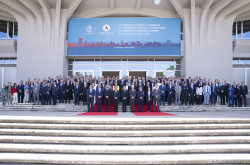In an opinion piece for Euronews, Secretary General Jürgen Stock addresses some of the misconceptions surrounding the role and activities of INTERPOL, in particular Red Notices.
The International Criminal Police Organization, or INTERPOL, is perhaps the most well-known yet least-understood organization.
I have lost track of the number of times I have seen an INTERPOL agent chasing a suspect in a film or television series. The result, while sometimes flattering, is rarely realistic.
In fact, part of the reason INTERPOL has been so successful over the past 100 years — growing from 20 to 195 member countries — is that we do not take over the activities of national law enforcement but rather support and augment them.
Today, as organized crime networks span continents and operate in borderless digital realms, international law enforcement cooperation has become the only way for police to fight back effectively.
We are here to help connect the dots on crime
Further complicating this new normal, investigators might not even know which police agency in the world holds the missing piece of the puzzle that will break a case.
This is precisely why INTERPOL was created, to help police connect the dots in investigations that increasingly extend beyond national borders.
Today, our 19 global databases contain some 125 million records, which are searched on average 200 times per second.
This means police can instantly verify if the person standing in front of them is a wanted terrorist, if the vehicle they are inspecting has been reported stolen, or if the gun recovered from a crime scene has been used elsewhere.
For investigations into online child sexual abuse — one of the most appalling and fastest-growing crime types — specialized officers from around the world use INTERPOL's dedicated database, identifying hundreds of victims every year and bringing their abusers to justice.
These are the facts on Red Notices
Our colour-coded Notices system, of which the Red Notice is the best known, enables countries to share alerts and requests for information worldwide.
Here again, though, much of what is written is often misinformed, misleading or simply false.
Contrary to popular belief, a Red Notice is not an international arrest warrant.
It is a request for law enforcement globally to identify, locate and arrest an individual, with each country deciding what action it will take.
Red Notices are extremely powerful tools for cooperation. They play a vital role in helping to locate and arrest murderers, rapists and fraudsters, no matter where they try to evade justice or for how long.
A recent example was the arrest of 'Ndrangheta fugitive Edgardo Greco in Saint-Etienne, France, who had been on the run for 16 years after escaping temporary police custody in Italy.
Few people know that the first INTERPOL Notice for Osama bin Laden was issued in 1998 at the request of Libya, then under Muammar Ghaddafi’s rule.
Less than five months later, some 200 people would lose their lives at the hands of al Qaeda in Dar es Salaam, Tanzania and in Nairobi, Kenya.
Safeguards are in place — and the statistics show it's working
Every so often, a critic will decry the Red Notice system, claiming certain countries primarily use it for political purposes.
Our constitution prohibits the organization from undertaking, or being used for activities of a political, military, religious or racial nature.
Although INTERPOL is a technical policing organization, we are not blind to geopolitical realities. Red Notices are not issued in an information vacuum.
In 2016, with the support of the INTERPOL General Assembly, I put in place a series of reforms and safeguards to ensure the integrity of the Red Notice system.
This included the creation of a specialized task force to carry out a formal robust legal review of all Red Notices and wanted person alerts to make sure that they are compliant with our rules and regulations based on the information available at the time.
There have been cases of non-compliance, and each case is one too many, especially for the individual concerned, but we are constantly reviewing and enhancing our processes to ensure the system is as strong as possible.
Publicly available statistics show that an extremely small percentage of Red Notice requests sent to the General Secretariat are found to be non-compliant and therefore refused.
For example, in 2021, out of the 23,716 wanted persons alerts issued via INTERPOL, a total of 483 were refused or cancelled as they were either not within the spirit of the Universal Declaration of Human Rights or were political, military, religious or racial in nature.
That's 483 out of 23,716.
Anyone who claims our organization is not treating Red Notices with the utmost due diligence is deliberately ignoring the facts.
A trusted platform in a fragmented world
Therefore, instead of focusing on misguided opinions and exceptions, we should look at the big picture.
Criminals will never hesitate to exploit a crisis, and today we are facing multiple concurrent crises.
We continue to work with our member countries to combat the global cybercrime wave created by COVID-19.
To protect our planet’s biodiversity reserves, law enforcement will have to redouble its efforts to dismantle transnational criminal networks preying on increasingly rare and vital resources.
Where new geopolitical tensions between countries flare up, we will continue to offer a trusted, secure platform to keep police information flowing and ensure criminals cannot hide within the rifts that a more fragmented world can create.








